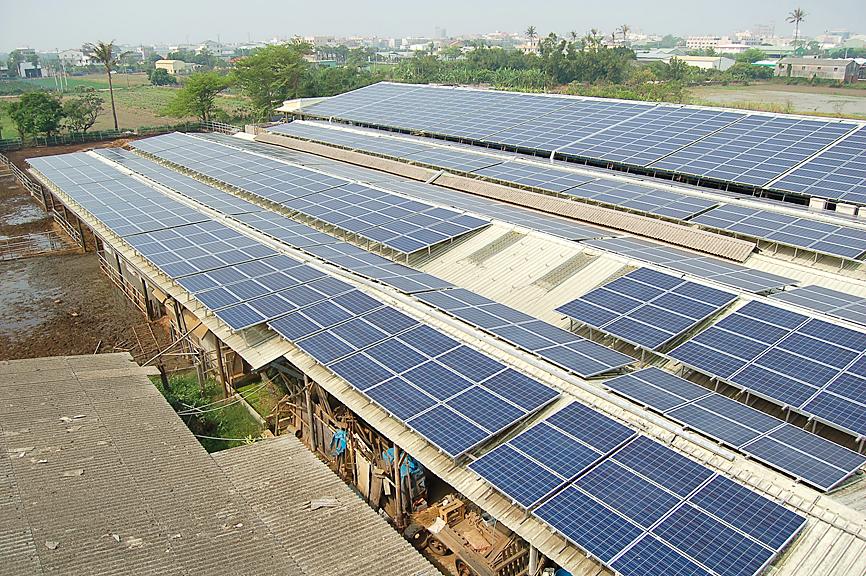Livestock buildings that have solar panels installed on the roof can be expanded in size by 30 percent as soon as next month, following the passage of the Council of Agriculture’s (COA) amendments to the Regulatory Standards for Animal Farms’ Primary Facilities (畜牧場主要設施設置標準).
The amendments introduce regulations on how big quail coops should be after the council previously said quails would be considered a kind of poultry.
Considering the trend toward renewable energy, the amendments state that livestock buildings with rooftop solar panels can be bigger than previously allowed, council officials said.

Photo: Yang Chin-cheng, Taipei Times
The government’s green energy policy hopes to lead to 20 gigawatts (GW) of energy generation, and rooftop solar panels are expected to contribute 6GW, they said.
The council said it is encouraging farmers to install solar panels on roofs of buildings that house livestock.
Of the 15,702 registered livestock buildings, 3,017 have solar panels on their roofs, the council said, adding that it expects all livestock buildings in Taiwan to have solar panel rooftops by 2025.
COA Department of Animal Industry Deputy Director Chiang Wen-chuan (江文全) on Saturday said that while farmers are willing, renewable energy installations on farms must take Taiwan Power Co (Taipower) feeder lines distribution into consideration.
Many livestock facilities in rural areas often do not have feeder lines in their vicinity, he said.
The council is discussing with Taipower about setting up more feeder lines, he added.
Chiang said the amendment also bans the use of battery cages for ducks.
Multilevel cages must not exceed three stories and should conform with regulations on the maximum space they can occupy, he said.
While fewer than 30 farms in the nation use cages to keep ducks, the council hopes to keep abreast of international trends, with the EU banning battery cages and other countries leaning toward reducing their numbers, Chiang said.

A magnitude 6.4 earthquake struck off the coast of Hualien County in eastern Taiwan at 7pm yesterday, the Central Weather Administration (CWA) said. The epicenter of the temblor was at sea, about 69.9km south of Hualien County Hall, at a depth of 30.9km, it said. There were no immediate reports of damage resulting from the quake. The earthquake’s intensity, which gauges the actual effect of a temblor, was highest in Taitung County’s Changbin Township (長濱), where it measured 5 on Taiwan’s seven-tier intensity scale. The quake also measured an intensity of 4 in Hualien, Nantou, Chiayi, Yunlin, Changhua and Miaoli counties, as well as

Taiwan is to have nine extended holidays next year, led by a nine-day Lunar New Year break, the Cabinet announced yesterday. The nine-day Lunar New Year holiday next year matches the length of this year’s holiday, which featured six extended holidays. The increase in extended holidays is due to the Act on the Implementation of Commemorative and Festival Holidays (紀念日及節日實施條例), which was passed early last month with support from the opposition Chinese Nationalist Party (KMT) and Taiwan People’s Party. Under the new act, the day before Lunar New Year’s Eve is also a national holiday, and Labor Day would no longer be limited

COMMITMENTS: The company had a relatively low renewable ratio at 56 percent and did not have any goal to achieve 100 percent renewable energy, the report said Pegatron Corp ranked the lowest among five major final assembly suppliers in progressing toward Apple Inc’s commitment to be 100 percent carbon neutral by 2030, a Greenpeace East Asia report said yesterday. While Apple has set the goal of using 100 percent renewable energy across its entire business, supply chain and product lifecycle by 2030, carbon emissions from electronics manufacturing are rising globally due to increased energy consumption, it said. Given that carbon emissions from its supply chain accounted for more than half of its total emissions last year, Greenpeace East Asia evaluated the green transition performance of Apple’s five largest final

Taiwan is to extend its visa-waiver program for Philippine passport holders for another year, starting on Aug. 1, Minister of Foreign Affairs Lin Chia-lung (林佳龍) said on Friday. Lin made the announcement during a reception in Taipei marking the 127th anniversary of Philippine independence and the 50th anniversary of the establishment of the Manila Economic and Cultural Office (MECO) in Taiwan, the Ministry of Foreign Affairs said. The decision reflected Taiwan’s commitment to deepening exchanges with the Philippines, the statement cited Lin as saying, adding that it was a key partner under the New Southbound Policy launched in 2016. Lin also expressed hope